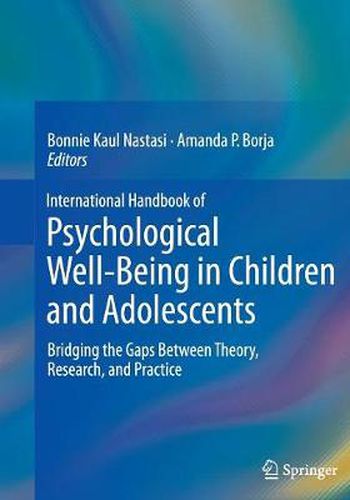Readings Newsletter
Become a Readings Member to make your shopping experience even easier.
Sign in or sign up for free!
You’re not far away from qualifying for FREE standard shipping within Australia
You’ve qualified for FREE standard shipping within Australia
The cart is loading…






This title is printed to order. This book may have been self-published. If so, we cannot guarantee the quality of the content. In the main most books will have gone through the editing process however some may not. We therefore suggest that you be aware of this before ordering this book. If in doubt check either the author or publisher’s details as we are unable to accept any returns unless they are faulty. Please contact us if you have any questions.
This handbook addresses universal developmental and cultural factors contributing to child and adolescent mental health and well-being across the globe. It examines sociocultural contexts of development and identifies children’s and adolescents’ perspectives as critical to understanding and promoting their psychological well-being. It details the Promoting Psychological Well-Being Globally project’s methodology for data collection and analysis, provides cross-cultural analyses of its findings, and offers a practical model for clinicians and other professionals seeking to apply this knowledge to real-life settings.
Featured topics include:
Sexual health, gender roles, and psychological well-being in India. Psychological well-being as a new educational boundary in Italy. Mapping psychological well-being in Romania. Youth perspectives on contributing factors to psychological well-being in Sri Lanka. Culturally specific res
ilience and vulnerability in Tanzania.Longing for a balanced life - the voices of Chinese-American/immigrant youth in the United States.
The International Handbook of Psychological Well-Being in Children and Adolescents: Bridging the Gaps Between Theory, Research, and Practice is an invaluable resources for researchers, clinicians, scientist-practitioners, and graduate students in child and school psychology, social work, public health, positive psychology, educational policy and politics, and maternal and child health.
$9.00 standard shipping within Australia
FREE standard shipping within Australia for orders over $100.00
Express & International shipping calculated at checkout
This title is printed to order. This book may have been self-published. If so, we cannot guarantee the quality of the content. In the main most books will have gone through the editing process however some may not. We therefore suggest that you be aware of this before ordering this book. If in doubt check either the author or publisher’s details as we are unable to accept any returns unless they are faulty. Please contact us if you have any questions.
This handbook addresses universal developmental and cultural factors contributing to child and adolescent mental health and well-being across the globe. It examines sociocultural contexts of development and identifies children’s and adolescents’ perspectives as critical to understanding and promoting their psychological well-being. It details the Promoting Psychological Well-Being Globally project’s methodology for data collection and analysis, provides cross-cultural analyses of its findings, and offers a practical model for clinicians and other professionals seeking to apply this knowledge to real-life settings.
Featured topics include:
Sexual health, gender roles, and psychological well-being in India. Psychological well-being as a new educational boundary in Italy. Mapping psychological well-being in Romania. Youth perspectives on contributing factors to psychological well-being in Sri Lanka. Culturally specific res
ilience and vulnerability in Tanzania.Longing for a balanced life - the voices of Chinese-American/immigrant youth in the United States.
The International Handbook of Psychological Well-Being in Children and Adolescents: Bridging the Gaps Between Theory, Research, and Practice is an invaluable resources for researchers, clinicians, scientist-practitioners, and graduate students in child and school psychology, social work, public health, positive psychology, educational policy and politics, and maternal and child health.